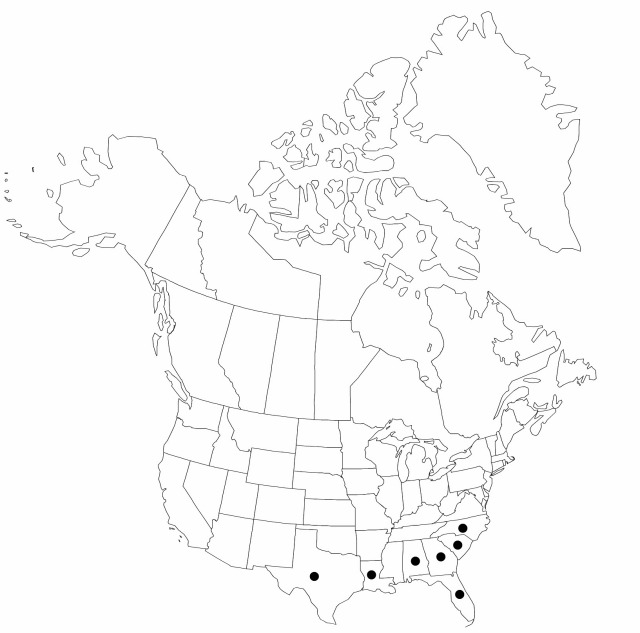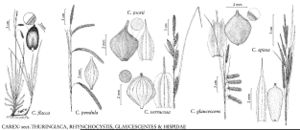Carex verrucosa
Descr. Gram., 261. 1817.
Culms to 125 cm. Leaves: sheaths glaucous, fronts indistinctly veined, veins not persisting, apex thin, concave; blades 120 cm × 10 mm, glabrous or sparsely scabrous on margins and abaxial surface. Inflorescences with 5–7 spikes, 30 cm; peduncle of terminal spike to 3.5–6 cm; proximal bracts equaling or exceeding inflorescence, 3–5 mm wide; lateral spikes erect, 2–6 cm × 7 mm; terminal staminate spikelets usually absent. Pistillate scales shorter and narrower than perigynia, apex retuse, awn to 2 mm. Perigynia ascending, redbrown or whitish, angles veined, faces inconspicuously 3–8-veined, stipitate, widely elliptic or obovate, 3.2–4 × 2.5–3 mm, base rounded, apex obtuse to somewhat tapered, densely papillose with rounded white papillae, sometimes strongly glaucous; stipe to 0.2 mm; beak to 0.2 mm, entire. Achenes rhomboid, 2.5–2.7 × 2.5–2.7 mm, base not conspicuously broadened.
Phenology: Fruiting Jun–Jul.
Habitat: Shallow water in cypress ponds, shallow depressions in marshes
Elevation: 0–200 m
Distribution

Ala., Fla., Ga., La., N.C., S.C., Tex.
Discussion
Numerous authors have considered Carex verrucosa and C. glaucescens conspecific. L. H. Bailey (1889) stated that the two forms are not sufficiently distinct to merit even a varietal separation. The two taxa are separable on proximal sheaths, spike orientation, presence of staminate spikelets at the apex of pistillate spikes, perigynium shape, and achene shape. They are also phenologically distinct, with flowering times separated by 1–2 months.
Selected References
None.
Lower Taxa
"shortened" is not a number."shorter and narrower" is not a number.
